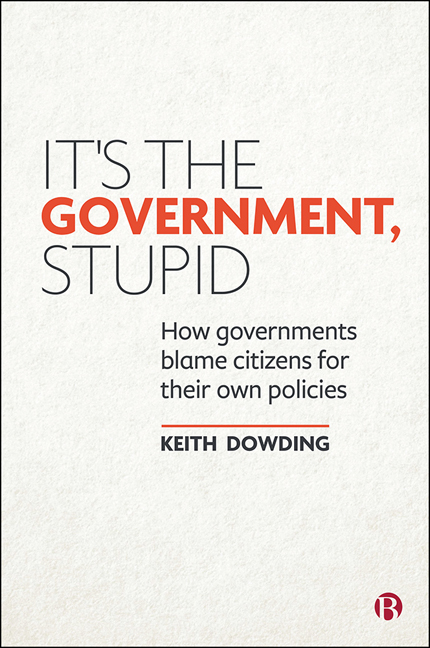7 - Government Responsibility
Published online by Cambridge University Press: 10 March 2021
Summary
Governments blame citizens for their own policies. The modern ideology of individualism and personal responsibility adopted by governments has allowed them to push the idea that their citizens must take responsibility for their own lives and be responsible for their own decisions, and therefore for the consequences of those decisions. That means they can be blamed for ill health, their accommodation and other aspects of their lives. Governments do acknowledge certain limits to that claim. They accept that some health conditions are genetic or due to bad luck, that addiction makes responsible behaviour problematic – but these are limits at the margins. Citizens are responsible for their actions, but can only be held responsible for making reasonable choices from the menu of opportunities they face. Government is the major agent setting that menu. In most areas of life, government is responsible for social outcomes, be they good or bad.
The personal responsibility agenda fits with the idea that government should not be trusted. Government should be minimal, meaning its regulations are light or non-existent. However, that simply means that large corporations and powerful individuals can act irresponsibly with no accountability. We see that with food manufacture, with the arms trade and in the gambling industry. We also see it in the finance and banking industries. In other areas, including housing, individual actions prompted by the financial incentives set up by governments have led to a crisis where the poor have no dwellings to live in at all, and the young middle class cannot afford to buy homes as their parents and grandparents did. Government is to blame. I will first review my arguments in the areas I have examined and then look at a set of criticisms that might be levelled at my argument.
Review
I have looked at some policy areas where we might think that government regulatory policies are problematic: gun control, obesity, housing, gambling and drugs. We might also have considered myriad others – transport, the environment, sports policy, gender discrimination in the workplace – or the big one that may make all the rest seem trivial: climate change. The topics I have chosen to discuss were picked for two reasons. First, they are all relatively small or enclosed policy areas where the regulatory issues are comparatively self-contained. Second, I selected these particular ones in order to illustrate different aspects of my argument.
- Type
- Chapter
- Information
- It's the Government, StupidHow Governments Blame Citizens for Their Own Policies, pp. 135 - 168Publisher: Bristol University PressPrint publication year: 2020

